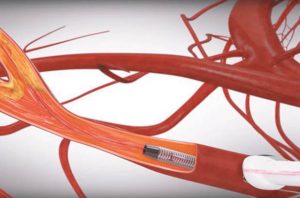Understanding the Increased Risk of Stroke and the Advantages of TCAR Procedure
 Carotid artery disease poses a significant risk to individuals worldwide, as it is a leading cause of stroke. This condition occurs when the carotid arteries, responsible for supplying blood to the brain, become narrowed or blocked by a buildup of plaque. The risk of stroke significantly increases with carotid artery disease, making it crucial to explore effective treatment options. One such procedure, Transcarotid Artery Revascularization (TCAR), offers a promising alternative to the traditional method known as carotid endarterectomy (CEA). In this article, we will delve into carotid artery disease, the heightened risk of stroke, and how TCAR offers a safe approach to treatment.
Carotid artery disease poses a significant risk to individuals worldwide, as it is a leading cause of stroke. This condition occurs when the carotid arteries, responsible for supplying blood to the brain, become narrowed or blocked by a buildup of plaque. The risk of stroke significantly increases with carotid artery disease, making it crucial to explore effective treatment options. One such procedure, Transcarotid Artery Revascularization (TCAR), offers a promising alternative to the traditional method known as carotid endarterectomy (CEA). In this article, we will delve into carotid artery disease, the heightened risk of stroke, and how TCAR offers a safe approach to treatment.
Understanding Carotid Artery Disease
Carotid artery disease occurs when plaque accumulates in the carotid arteries, obstructing blood flow to the brain. Plaque consists of cholesterol, fat, calcium, and other substances that gradually accumulate on artery walls, forming a sticky substance. Over time, this buildup can narrow the arteries, restricting blood flow. In severe cases, the plaque can rupture, leading to the formation of blood clots that may cause a stroke.
The Increased Risk of Stroke
Carotid artery disease significantly raises the risk of stroke. As the arteries narrow, blood flow to the brain is compromised, increasing the likelihood of clot formation. If a clot breaks loose and travels to the brain, it can block a smaller artery, resulting in an ischemic stroke. Ischemic strokes account for approximately 80% of all strokes and can cause severe brain damage or even death.
Moreover, carotid artery disease poses an additional risk when the plaque becomes unstable or ruptures. This can trigger the formation of larger clots, leading to more severe strokes. Therefore, early detection and appropriate intervention are vital in mitigating the risk of stroke associated with carotid artery disease.
The Advantages of TCAR Procedure
Transcarotid Artery Revascularization (TCAR) has emerged as a minimally invasive alternative to carotid endarterectomy (CEA) for treating carotid artery disease. TCAR combines the benefits of traditional surgical techniques with innovative technology, resulting in improved outcomes and reduced risks.
Unlike CEA, which involves a large incision in the neck, TCAR uses a smaller incision near the collarbone. Through this incision, a sheath is inserted into the carotid artery, allowing blood to be temporarily rerouted outside the body, minimizing the risk of stroke during the procedure. The blood is filtered and returned to the body through a second sheath inserted in the femoral vein.
TCAR offers several advantages over CEA. Firstly, it reduces the risk of stroke during the procedure by reversing blood flow away from the brain, preventing any dislodged plaque or debris from reaching critical areas. Additionally, TCAR minimizes the risk of nerve damage, as the procedure involves precise control over blood flow.
Moreover, TCAR is suitable for high-risk patients who may not be eligible for CEA due to prior neck surgeries, radiation therapy, or anatomical considerations. The procedure is generally associated with faster recovery times and reduced scarring compared to CEA.
Carotid artery disease presents a serious risk of stroke due to the potential for plaque rupture or clot formation. However, by understanding the disease and the available treatment options, individuals can take proactive steps to mitigate these risks. The TCAR procedure offers a safe alternative to the traditional carotid endarterectomy surgery, significantly reducing the chances of stroke during the intervention. By opting for TCAR, patients can benefit from improved outcomes, faster recovery times, and ultimately, a reduced risk of stroke. Consulting with healthcare professionals can provide individuals with the necessary information to make informed decisions about their vascular health and well-being.
The Vascular and Vein Center at Gulfcoast Surgeons is one of the first and most respected vein clinics in Southwest Florida. Our surgeons, Dr. Abraham Sadighi and Dr. Johan Escribano have performed thousands of vascular and vein surgeries over the past 28 years. We focus on diseases of the vascular system that can range from harmless but unattractive spider veins to dangerous conditions such as peripheral artery disease. Our caring and dedicated team will help you identify problems and offer the best treatment options for you at any of our three locations.
Vascular and Vein Center at Gulfcoast Surgeons
877-LEG-PAIN
gulfcoastsurgeons.com
Fort Myers
8010 Summerlin Lakes Dr., Ste. 100
Fort Myers, FL 33907
Cape Coral
1003 Del Prado Blvd., Ste. 303
Cape Coral, FL 33990
Bonita Springs
24301 Walden Center Dr., Ste. 102
Bonita Springs, FL 34134









